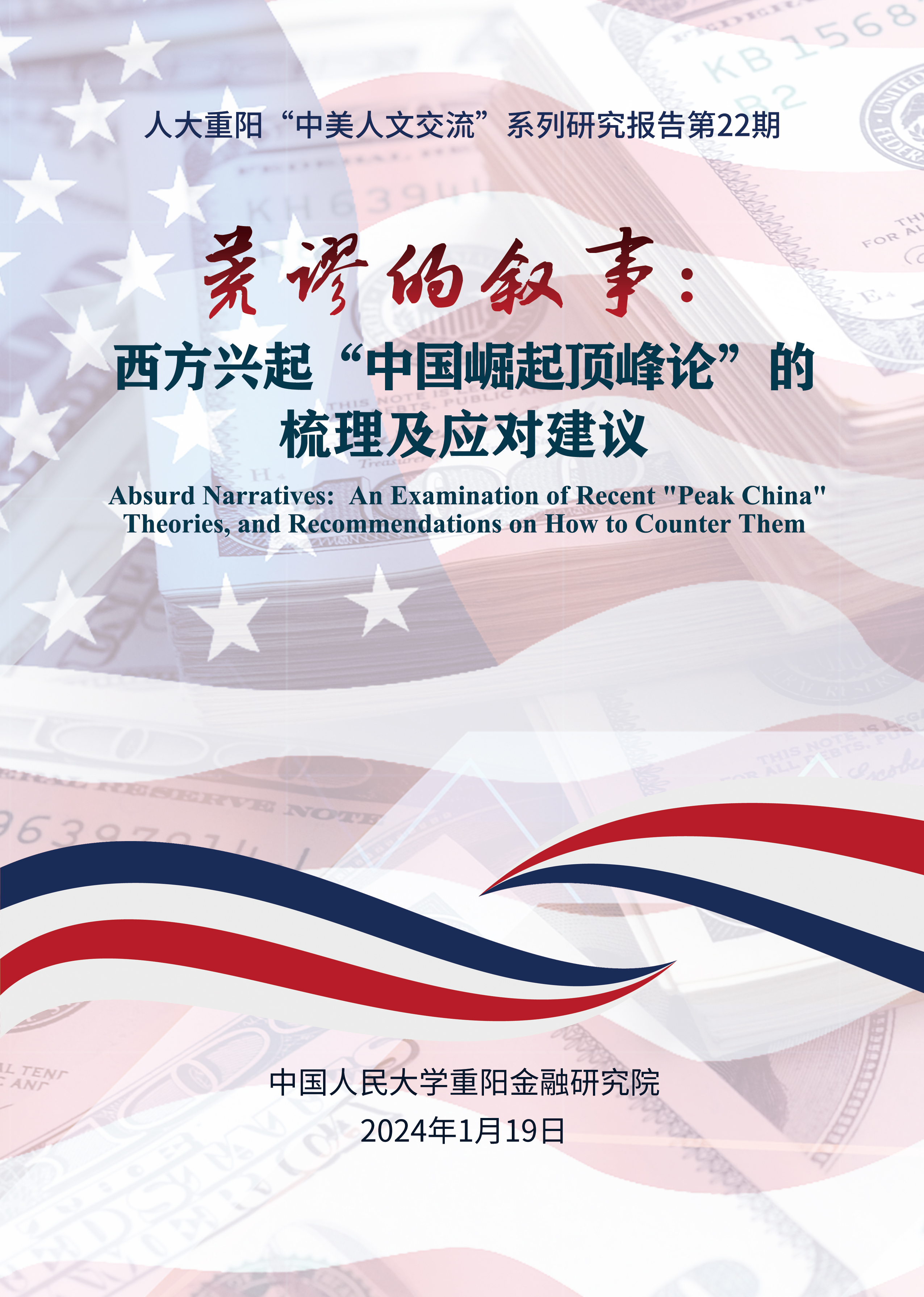Reports
Your Present Location: PUBLICATIONS> ReportsRDCY "The China-US People-to-People Exchange" Series Research Report No.22: Absurd Narratives: An Examination of Recent “Peak China” Theories, and Recommendations on How to Counter Them

Executive Summary
In recent years, politicians, media and think tanks in the West have stirred up a round of 'peak China' theories, maintaining that China's rise has reached its peak, disparaging China's development prospects, and suppressing expectations on China's growth. Especially since Q2 2023, almost all mainstream Western media outlets, and think tanks, publish one or more articles every day commenting on China's slowing economic growth, setting the agenda for 'peak China' in various ways.
This round of 'peak China' theories are but renewed versions of the 'China collapse' theories, although exhibiting some new characteristics—large-scale, high-frequency, long-duration, wide-scope, and originating from numerous sources. The rationale behind this round of 'peak China' theories is also more 'refined'. The narrative focuses on China's underperforming, lower-than-expected post-pandemic era economic data. It is argued that the Chinese economy faces profound problems at the structural and decision making level, while economic woes also betray deeper vulnerabilities within China.
This report sorts out the four different narratives behind this round of 'peak China' theories: First, China's economic data in recent years have reflected deep structural problems and problems with China's growth model, and economic downturn is inevitable in the medium-to-long-term. Second, China's economic problems reflect decision-makers' mistaken estimates and choices, economic policies and 'confidence stabilizing' measures will continue to vacillate and remain ineffective, while ideology hinders efforts to boost the economy. Third, the expected rebound of China's economy after the pandemic has been weak and disappointing, while at the same time the performance of the US economy has created a stark contrast—blind optimism about China's economic prospects lacks factual basis. Forth, the external environment is extremely unfavorable to China, the US remains a formidable power and will effectively curb China's development.
The West has recently stepped up publicity efforts against China. Although this is not the root cause of the economic slowdown, the stock market fluctuations, and the decline in foreign investment, the publicity efforts will inevitably amplify the negative impacts and form a vicious cycle. The 'peak China' theories propped up by Western politicians, media, and think tanks are finding resonance with some domestic audience within China, and through the endorsement of various so-called 'experts' and 'research institutions', they attempt to comprehensively suppress, provoke, and influence China's economy and society.
The impact of narrative on China is showing in some areas of the economy, and may cause the following harms: First, it amplifies pessimistic expectations on the market, which in turn affects China's economic recovery. Second, it affects foreign investors' evaluation of China, reducing foreign investment in China. Third, it stirs investor sentiment, leading to violent fluctuations in the stock market. Fourth, it triggers a tide of emigration of the wealthy, resulting in the outflow of capital and management talents, and a decline in domestic investment and employment. Fifth, it overshadows China's economic gains and progress, leading other countries to form prejudices and misunderstandings about China's future development potential. Sixth, it disrupts public sentiment and affects domestic unity, thereby triggering social unrest. Seventh, it affects the country's reputation and international status, causing people to lose respect for China, negatively impacting China's international influence.
This report makes the case that the most urgent tasks at hand are to uphold the deepening of reforms, pursue all-dimensional opening-up, grow the economic pie, and enhance the general public's sense of gain, so that the absurdity of 'peak China' narratives can be shown with hard facts. At the same time, the following recommendations are put forward: First, countering the 'peak China' theories should be regarded as a key, long-term international communications project. Second, a series of comprehensive opening-up policies and implementation results should be continuously released and reported on; and at the level of public opinion, contributions of foreign capital should be highly recognized and given due courtesies. Third, friendly foreigners who understand and loves China should be valued as an important force in telling China's stories well. Fourth, defend the image of Chinese leaders and use transnational legal measures to take legal actions against unfair Western media outlets. Fifth, change the way of telling China's stories, create content models suitable for foreign audiences, and avoid falling into the trap of 'political propaganda'. Sixth, in the process of foreign exchanges and external communications, attention must be paid to support and foster Generation Z at home and abroad.
At the same time, preparations—in terms of leadership, intellectual and financial resources and beyond—should be made to counter the West's rhetoric, encirclement, and battle for the mind. China should invest heavily in launching a public opinion counteroffensive against 'peak China' theories. In the face of this round of 'political propaganda' offensive launched by the US, waves of counteroffensive battle of the mind, and counter-encirclement and suppression campaigns will surely make a substantial contribution to restoring the international community's confidence in China's economy.
Key Words: "Peak China" Theories, The West, Economy























































































 京公网安备 11010802037854号
京公网安备 11010802037854号





